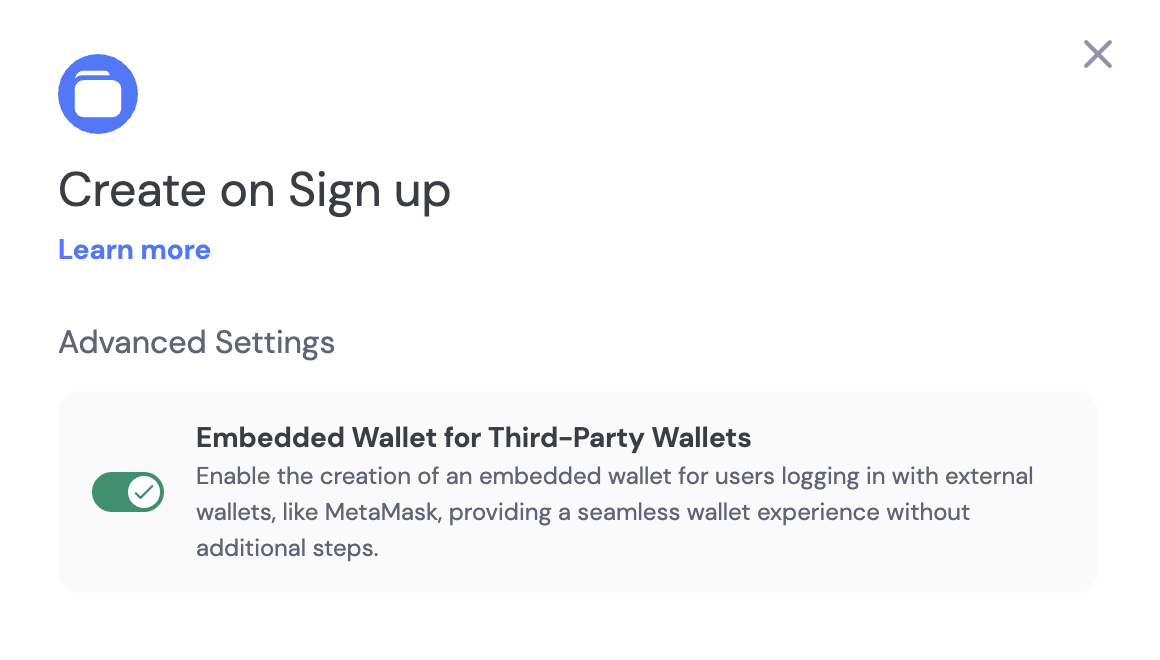Please make sure you are on V4 of the SDK on your frontend before continuing.
During Signup (Automatic)
Creating wallets for non-wallet authentication login
By default, embedded wallets are created automatically for users during sign-up if they don’t already have a wallet on the enabled chain. All you have to do is check that the “Create on Sign up” toggle is turned on in the Embedded Wallet configuration page.
Creating wallets for external wallet login
Embedded wallets can be automatically created for users signing in with external wallets, such as Metamask. To enable this feature, click on the “Create on Sign up” card and expand the “Advanced Options” panel. Lastly, ensure that the “Embedded Wallet for Third-Party Wallets” toggle is enabled.
Automatic embedded wallet creation only creates a single wallet for a user on
each chain you have selected. If you want to create multiple wallets per chain
you will need to use the
createEmbeddedWalletAccount
method from the
useEmbeddedWallet hook. See creating additional walletsBefore Signup (Pre-generated)
Pre-generated wallets allow you to create a wallet for a user prior to their first interaction with your application using either an email, phone number or social identifier (i.e. Farcaster or Twitter). Simply provide an identifier to our API and receive the new wallet address in the response. The user can receive funds and assets into their wallet before they sign up!Creating wallets on additional chains
For users with an existing embedded wallet on a single chain, you can create an embedded wallet on an additional chain using the createEmbeddedWalletAccount method exported from theuseEmbeddedWallet hook.
Custom Logic (manual)
Creating wallets any time
If you do not want to create wallets for users automatically when they sign up, you can create wallets for users using custom logic. This can be done by calling thecreateEmbeddedWallet method from the useEmbeddedWallet hook.
Creating additional wallets
For users with an existing embedded wallet, you can create additional embedded wallets using the createEmbeddedWalletAccount method exported from theuseEmbeddedWallet hook.
Using the createEmbeddedWalletAccount method to create additional wallets on the same chain derives wallets from the user’s existing secret recovery phrase. This means that the user can access all their wallets using the same exported recovery phrase for each chain. The private keys for each wallet are derived from the recovery phrase and are unique to each wallet.
The limitations for creating additional wallets are as follows:
- Maximum of 5 wallets per chain
- Maximum of 15 wallets per user
- If Smart Wallets are enabled, each generated signer wallet will have its own AA-enabled wallet
Creating Embedded Wallet alongside Branded Wallet
First, ensure that the “Create on Sign up” toggle in the Embedded Wallet configuration page is toggled on. Then use thecreateEmbeddedWallet method from the useEmbeddedWallet hook to create a wallet for a user who has signed up using a branded wallet.
You can tell if you need to create that wallet post signup by checking userHasEmbeddedWallet from the useEmbeddedWallet hook.